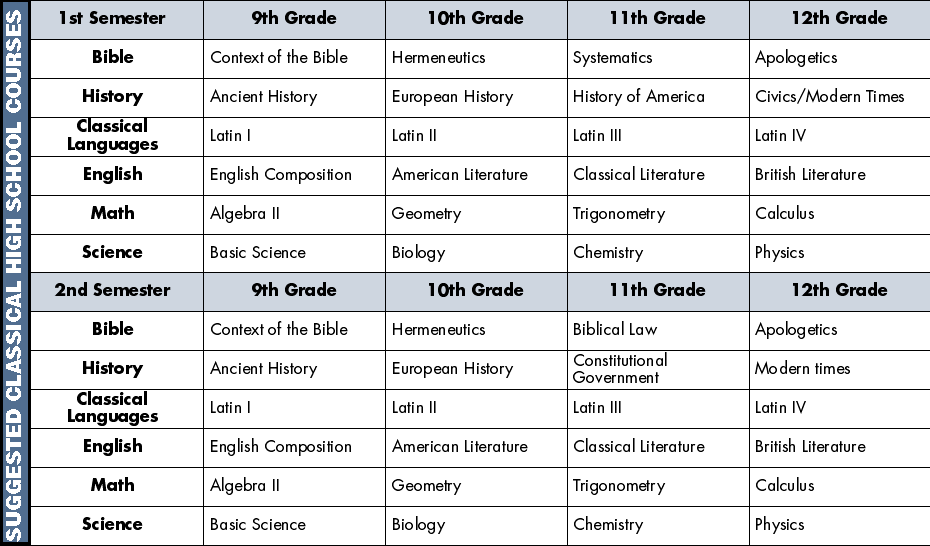 Classical education is both a particular set of subjects and a sequence
in which they are taught. We follow the sequence of the Trivium, a
medieval course of study consisting of three stages: grammar,
dialectic, and rhetoric.
Classical education is both a particular set of subjects and a sequence
in which they are taught. We follow the sequence of the Trivium, a
medieval course of study consisting of three stages: grammar,
dialectic, and rhetoric.
Dorothy Sayers observed that these three stages correspond nicely to
three observable stages of child developments. Children in the grammar,
or “Poll-parrot” stage (roughly, the elementary years) do well at
memorizing mountains of facts. Children in the dialectic, or “Pert”
stage (roughly, junior high age) do well at learning logic and
argumentation. Young men and women in the rhetoric, or “Poetic” stage
are concerned for appearances, and readily take to the study of
rhetoric.
Classical education includes many traditional subjects, such as math and
history. It also includes the study of classical languages, classical
history, formal logic, and rhetoric. Christian classical education
teaches all this in the context of a Christian worldview.
Throughout all stages, the student is being trained in the art of
thinking in the light of God’s revelation of Himself in Scripture. The
student is not just learning what to think, he is learning how to think.
Course of Study
As you look at the chart of suggested courses on the next page, remember
we’re assuming that certain subjects have already been taught in earlier
grades. For example, formal logic should be taught in the junior high
years. The student should come into high school with a firm grasp of
English grammar. And so on.
Let me explain what a few of these courses are about. Context of the
Bible teaches the student that we can understand the Bible better by
studying the history and manners of the cultures in which it first
arrived. This leads naturally to Hermeneutics, which is the science of
interpretation. How is the text of Scripture to be handled—and why? In
the eleventh grade, students should systematically study basic Christian
doctrine. In the next semester, the student should learn that doctrine
is meant to be lived, to be put into practice. This year of study covers
what we are to believe, and what we are to do. Finally, in Apologetics,
the student learns to articulate and defend the Christian worldview as
he has learned it in all his other classes.
Ancient History ends at the fall of Rome. European History the next year
begins with the fall of Rome. The studies of the next year hand the
torch to the New World, with the study of American History revolving
around the important subject of government. The senior year covers
Modern Times—from the end of the War Between the States to the present.
Rhetoric should not be forgotten here, as the student presents a senior
thesis, to be presented and defended.
In the study of classical languages, much preparation should already
have taken place in the elementary years. In high school, the student
should be able to translate large amounts of material from Latin into
English. If there is an opportunity, in the senior year the student
could take on Greek instead of Latin IV—the study of Latin is an
excellent preparation for Greek.
By the end of English Grammar in eighth grade, the student should be
able to diagram complex sentences in his sleep, and should be ready for
English Composition in ninth. After the student is able to write a
decent sentence himself, he is then ready to undertake the studies of
literature appreciation, and worldview analysis, which begin full-tilt
in the tenth grade.
Although this course of study is rigorous, let’s not forget that the
goal of classical education is not to—quick!—get the information in
their heads before they leave home. Our goal is to teach them to think
from a platform of acquired truth.
A classically educated student has learned how to learn.
